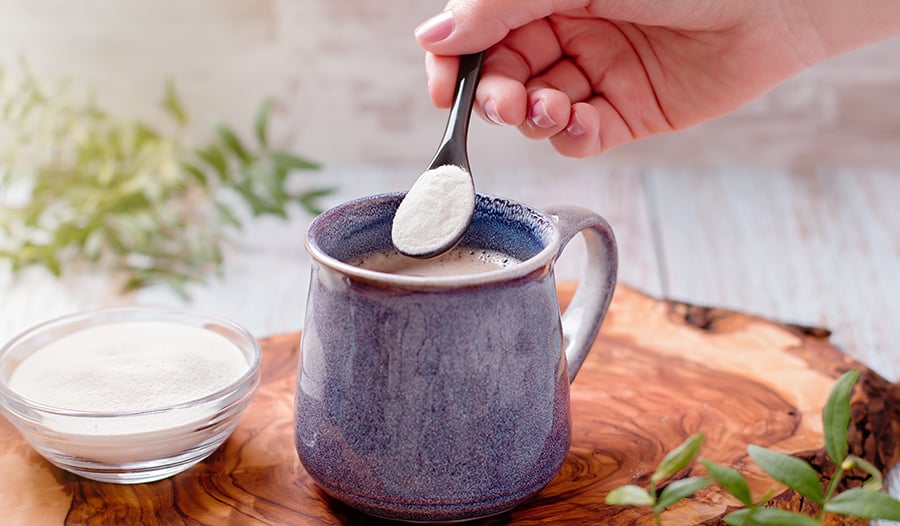Collagen: 3 Different Types + Their Health Benefits
DISCLAIMER:This blog does not intend to provide diagnosis...
- In this article:
- What Is Collagen?
- Types of Collagen
- Type I Collagen
- Type II Collagen
- Type III Collagen
- Health Benefits of Collagen
- Skin Benefits
- Nail Strength Benefits
- Joint Health Benefits
- Heart Benefits
- Takeaway

Collagen has recently found popularity as a supplement to promote healthy skin, hair, and nails. With a shift toward a more holistic approach to health, beauty, and anti-aging, many individuals wishing for a more natural approach to the fountain of youth are turning to collagen.
But what is collagen, and does it have any health benefits? Research suggests that collagen may benefit the health of the skin, joints, and even the cardiovascular system.
What Is Collagen?
Collagen has had a major impact on shaping the health and wellness spheres over the past few years. From bone broth to delicious flavored collagen powders to unassuming capsules, collagen seems to be a popular supplement for skin health and anti-aging routines.
The popularity of collagen can be attributed to research that suggests that collagen may have potential health benefits that range from promoting healthy skin to lustrous hair and strong, healthy nails.
But what exactly is collagen, and why is it necessary for optimal health?
For centuries, people noticed that a sticky, glue-like substance was created when connective tissues like ligaments or tendons were boiled. In the 19th century, this sticky, glue-like substance was named collagen after the Greek words meaning “to produce” and “glue.”
Collagen is a type of protein that is composed primarily of a mixture of specific amino acids. These amino acids usually include glycine, proline, and/or hydroxyproline. Glycine is the most abundant amino acid in collagen. Sometimes, the amino acid lysine is used in collagen synthesis as well. While these amino acids are essential to collagen composition, any of the 17 other amino acid combinations can be added to the base helical structure of the protein to make collagen.
Collagen is an endogenous protein—a type of protein that is made or synthesized within the body. To be synthesized, collagen requires some nutritional components, such as vitamin C, which acts as a cofactor for collagen synthesis. A cofactor is an essential substance that allows for enzymatic activity to take place. Without vitamin C, collagen synthesis slows down, which may contribute to slower wound healing.
One meta-analysis found that individuals taking a vitamin C supplement after a bone fracture or connective tissue injury, like a torn ligament, had increased short-term healing benefits and shorter healing times compared to those who didn’t.
Collagen is one of the most abundant proteins contributing to the function of the human body. It is estimated that collagen makes up 30% of all proteins in the body. Collagen’s main role is to provide structural integrity to the spaces in between the cells of connective tissues. It helps maintain the shape of tissues and cells by filling the spaces between cells. Collagen also supports the mechanical integrity of the body and plays a role in repairing damaged tissues.
Collagen belongs to a large group of proteins, or a superfamily, that contain different types of collagen with different roles in the body.
Types of Collagen
The collagen superfamily of proteins contains 28 different types. Each type of collagen is found in a distinctive place in the body, which helps to support the tissues and structures in that region.
Different types of collagen have different properties that help tissues to be more rigid, more flexible or allow for smooth movement of joints. While 28 different types of collagen have been discovered, the most common types are Type I, II, and III.
Type I Collagen
Type I collagen is the most abundant type of protein, making up approximately 90% of all the collagen in the body. Type I collagen is usually found in the bones, connective tissues, skin, corneas of the eyes, and tendons. Type I collagen plays a prominent functional role in maintaining the integrity of skin, connective tissues, and bones.
While other types of collagen offer more flexibility to certain tissues, type I collagen creates rigidity and offers support to tissues and structures. The load-bearing properties of type I collagen allow for greater mechanical stress to be placed on tendons and ligaments while at the same time supporting the skin to prevent sagging and wrinkles.
Type I collagen also plays a role in maintaining healthy hair and nails.
Type II Collagen
Type II collagen makes up over 90% of the collagen found in the cartilage of the joints. Type II collagen is mainly found in joints and intervertebral discs' articular or hyaline cartilage.
Hyaline cartilage is the most prevalent type of cartilage in the human body. Hyaline cartilage covers the joints. It allows for the smooth gliding movements of joints, sometimes called articular cartilage.
Type II collagen is also found predominately in elastic cartilage. Elastic cartilage supports body tissues and structures that must be flexible, bend, or move while regaining their shape quickly after removing the deforming force.
Since elastic cartilage is strong and flexible, it can be found in tissues and organs like the ear and the epiglottis. The epiglottis is a small appendage behind the tongue that covers the airway when swallowing so that food doesn’t go into the lungs when eating.
Type III Collagen
Type III collagen comprises 5-20% of the body's collagen content. Type III collagen predominately supports the structural integrity of hollow organs and tissues like the bowel, the uterus, and blood vessels.
Type III collagen is also found in the skin but decreases in amount with aging. Less than 20% of the collagen in adult skin is estimated to be type III.
Health Benefits of Collagen
Research has linked collagen to various health benefits, from promoting healthy skin to supporting healthy joints. Studies also indicate that collagen supplementation may be beneficial for maintaining overall health.
Skin Benefits
While the body creates its collagen, the amount produced decreases with age. It is estimated that after age 20, the body’s ability to produce collagen decreases by 1 to 1.5% each year.
The decrease in collagen production may lead to wrinkles, fine lines, sagging skin, joint issues, and even heart disease.
Collagen is important in maintaining skin health because it is a main component of the skin. Studies show that taking an oral collagen supplement may help to prevent sagging skin, wrinkles, and fine lines.
One meta-analysis of 19 studies with 1,125 female participants between 20 and 70 years of age looked at the effects of oral collagen supplementation over 90 days. The study found that collagen intake had an anti-aging effect on the skin by increasing skin hydration and elasticity. The study also found reduced wrinkles and sagging skin among the participants who took collagen. This change was not witnessed in the placebo groups.
Nail Strength Benefits
Collagen may also play a role in strengthening brittle nails. One study involving 25 participants found that oral collagen supplementation helped to reduce nail brittleness, cracks, and chipping by 42%. In addition, nail growth increased by 12% over 24 weeks. The study also noted that 64% of the participants saw an overall increase in the strength and quality of their nails while taking collagen.
Collagen supplementation may also help improve joint health. One study analyzed the results of 15 different studies on the effect of collagen on joint health. The study participants ranged from athletes to older individuals and premenopausal women. The study found that collagen supplementation was beneficial for improving joint functionality and improving the healing time for joint injuries.
Joint Health Benefits
Another randomized, double-blind, placebo-controlled study compared the effects of collagen to that of glucosamine chondroitin and placebo for knee osteoarthritis.
One hundred ninety-one participants were placed into one of three groups: collagen, glucosamine chondroitin, or placebo. The study found that collagen supplementation was superior to placebo and glucosamine chondroitin for pain reduction, increased mobility, better functionality, and decreased stiffness.
Studies suggest that collagen supplementation may even be beneficial for heart health. One study looked at the effects of collagen supplementation on low-density lipoprotein cholesterol (LDL) and high-density lipoprotein (HDL) cholesterol levels in humans.
Heart Benefits
Research has shown that high levels of LDL may contribute to hardening of the arteries, high blood pressure, heart disease, and stroke. The study found that daily supplementation with collagen for six months helped to lower LDL levels contributing to heart health.
Takeaway
Collagen is an amazing protein with various bodily functions, from supporting structural stability to strengthening skin and maintaining healthy joints. Studies show collagen supplementation may benefit supple skin and strong, flexible joints. Research suggests collagen supplementation may contribute to longevity by improving heart health and reducing the risk of arteriosclerosis. Adding collagen to any wellness-promoting routine may benefit overall health for years.
References:
- Amirrah IN, Lokanathan Y, Zulkiflee I, Wee MFMR, Motta A, Fauzi MB. A comprehensive review on collagen type I development of biomaterials for tissue engineering: from biosynthesis to bioscaffold. Biomedicines. 2022;10(9):2307. Published 2022 Sep 16. doi:10.3390/biomedicines10092307
- Antipova O, Orgel JP. In situ D-periodic molecular structure of type II collagen. J Biol Chem. 2010;285(10):7087-7096. doi:10.1074/jbc.M109.060400
- de Miranda RB, Weimer P, Rossi RC. Effects of hydrolyzed collagen supplementation on skin aging: a systematic review and meta-analysis. Int J Dermatol. 2021;60(12):1449-1461. doi:10.1111/ijd.15518
- DePhillipo NN, Aman ZS, Kennedy MI, Begley JP, Moatshe G, LaPrade RF. Efficacy of vitamin C supplementation on collagen synthesis and oxidative stress after musculoskeletal injuries: a systematic review. Orthop J Sports Med. 2018;6(10):2325967118804544. Published 2018 Oct 25. doi:10.1177/2325967118804544
- Hexsel D, Zague V, Schunck M, Siega C, Camozzato FO, Oesser S. Oral supplementation with specific bioactive collagen peptides improves nail growth and reduces symptoms of brittle nails. J Cosmet Dermatol. 2017;16(4):520-526. doi:10.1111/jocd.12393
- Khatri M, Naughton RJ, Clifford T, Harper LD, Corr L. The effects of collagen peptide supplementation on body composition, collagen synthesis, and recovery from joint injury and exercise: a systematic review. Amino Acids. 2021;53(10):1493-1506. doi:10.1007/s00726-021-03072-x
- Kuivaniemi H, Tromp G. Type III collagen (COL3A1): Gene and protein structure, tissue distribution, and associated diseases. Gene. 2019;707:151-171. doi:10.1016/j.gene.2019.05.003
- Lugo JP, Saiyed ZM, Lane NE. Efficacy and tolerability of an undenatured type II collagen supplement in modulating knee osteoarthritis symptoms: a multicenter randomized, double-blind, placebo-controlled study. Nutr J. 2016;15:14. Published 2016 Jan 29. doi:10.1186/s12937-016-0130-8
- Lugo JP, Saiyed ZM, Lau FC, et al. Undenatured type II collagen (UC-II®) for joint support: a randomized, double-blind, placebo-controlled study in healthy volunteers. J Int Soc Sports Nutr. 2013;10(1):48. Published 2013 Oct 24. doi:10.1186/1550-2783-10-48
- Naomi R, Ridzuan PM, Bahari H. Current insights into collagen type I. Polymers (Basel). 2021;13(16):2642. Published 2021 Aug 9. doi:10.3390/polym13162642
- Reilly DM, Lozano J. Skin collagen through the lifestages: importance for skin health and beauty. Plastic and Aesthetic Research. 2021; 8:2.
- Ricard-Blum S, Ruggiero F. The collagen superfamily: from the extracellular matrix to the cell membrane. Pathol Biol (Paris). 2005;53(7):430-442. doi:10.1016/j.patbio.2004.12.024
- Ricard-Blum S. The collagen family. Cold Spring Harb Perspect Biol. 2011;3(1):a004978. Published 2011 Jan 1. doi:10.1101/cshperspect.a004978
- Roberts S, Menage J, Sandell LJ, Evans EH, Richardson JB. Immunohistochemical study of collagen types I and II and procollagen IIA in human cartilage repair tissue following autologous chondrocyte implantation. Knee. 2009;16(5):398-404. doi:10.1016/j.knee.2009.02.004
- Tomosugi N, Yamamoto S, Takeuchi M, et al. Effect of collagen tripeptide on atherosclerosis in healthy humans. J Atheroscler Thromb. 2017;24(5):530-538. doi:10.5551/jat.36293
- Varma S, Orgel JP, Schieber JD. Nanomechanics of type I Collagen. Biophys J. 2016;111(1):50-56. doi:10.1016/j.bpj.2016.05.038
- Volk SW, Shah SR, Cohen AJ, et al. Type III collagen regulates osteoblastogenesis and the quantity of trabecular bone. Calcif Tissue Int. 2014;94(6):621-631. doi:10.1007/s00223-014-9843-x
- Wu M, Cronin K, Crane JS. Biochemistry, Collagen synthesis. In: StatPearls. Treasure Island (FL): StatPearls Publishing; September 12, 2022.

 By Dr. Candace Mathers, N.D.
By Dr. Candace Mathers, N.D.


